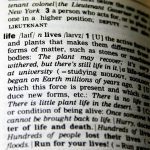Present Perfect: desde o passado até agora Posted by Adir on Jan 2, 2013 in Iniciante
 O Present Perfect tem sempre relação com o presente, com algo que tem resultados agora. Um dos seus usos é uma ação que começou no passado e ainda continua no presente. Leia este pequeno parágrafo:
O Present Perfect tem sempre relação com o presente, com algo que tem resultados agora. Um dos seus usos é uma ação que começou no passado e ainda continua no presente. Leia este pequeno parágrafo:
Jack has traveled a lot. He has been to a lot of places. He has been to China twice but he has never been to India.
Jack [já] viajou muito. Eles esteve em muitos lugares. Ele esteve na China duas vezes mas nunca esteve na Índia.
Perceba que Jack ainda está vivo e que ele ainda pode viajar, estar em vários lugares.
Com este uso o Present Perfect é usado com as seguintes palavras e expressões:
Ever – já (alguma vez na vida)
Never – nunca ( never = not + ever )
Many times – muitas vezes
Have you ever been to England? [Você já esteve na Inglaterra?]
No, I’ve never been to England. [Não, nunca estive na Inglaterra.]
Yes, I’ve been to England many times. [Sim, estive na Inglaterra muitas vezes.]
Recently – recentemente
In the last few days – nos últimos días
So far – até agora, até o momento
Have you heard from Sam recently? [Você teve notícias do Sam recentemente?]
I’ve met a lot of important people in the last few days. [Conheci muitas pessoas importantes nos últimos dias.]
Everything is going well. We haven’t had any problems so far. [Tudo está indo bem. Não tivemos nenhum problema até agora.]
Since – desde (usado para indicar o início de uma ação)
For – faz, por, há (usado para indicar a duração de uma ação)
He’s worked there for five months. [Ele trabalha lá há cinco meses.]
I haven’t eaten anything since breakfast. [Não como nada desde o café da manhã.]
Usamos o Present Perfect com períodos (morning, afternoon, evening, week, month, year) quando tais períodos não estão terminados na hora da fala. Veja alguns exemplos:
I’ve seen five movies this week. [Vi cinco filmes esta semana. – A semana ainda não acabou.]
The doctor has seen four patients this morning. [O medico atendeu quatro pacientes hoje de manhã. – A manhã ainda não acabou.]
I’ve drunk four cups of coffee today. [Bebi cinco xícaras de café hoje. – O dia ainda não acabou e posso tomar mais.]
Have you taken a vacation this year? [Você tirou férias este ano? – O ano não acabou ainda.]
You haven’t worked very hard this term. [Você não se esforçou muito este semestre.]
Também usamos o Present Perfect para indicar que é a primeira (segunda, terceira, etc.) vez que algo acontece.
This is the first time I’ve driven a car. [Esta é a primeira vez que eu dirijo um carro.]
This is the first good meal I’ve had in ages. [Esta é a primeira boa refeição que eu faço há tempos.]
Bill is calling again, you should answer it. This is the third time he’s called you this evening. [Bill está ligando novamente, você deveria atender. Esta é a terceira vez que ele te liga esta noite.]
Fonte: Curso de Present Perfect – Teoría e Exercícios, de Adir Ferreira. Compre aqui.

Build vocabulary, practice pronunciation, and more with Transparent Language Online. Available anytime, anywhere, on any device.
About the Author: Adir
English / Spanish teacher and translator for over 20 years. I have been blogging since 2007 and I am also a professional singer in my spare time.




Comments:
Rafael:
Hey Adir, how’s it going?
I follow your website weekly, and surely I’ve learned a lot.
So, I’d like to ask you about a little doubt.
Which is correct to say?
I’ve been TO London? or
I’ve been IN Lodon?
Is there any difference?
Thanks!
Best Regards.
Rafael
Adir Ferreira:
Hi, Rafael!
I’ve been to London = I was there, visiting, it doesn’t matter when (the action of being there is important).
I’ve been in London = it needs a time expression to complement it. For example ==> I’ve been in London for three weeks and I love it!
Did it help?